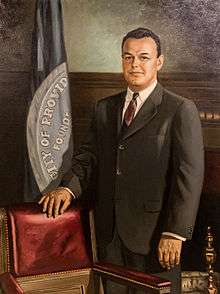Joseph A. Doorley Jr.
Joseph A. Doorley Jr. (born October 12, 1930) is an Irish-American lawyer[1] who served as mayor of Providence, Rhode Island from 1965 to 1975. At the time of his election, he was the youngest mayor in the city's history.[2][3][4] Doorley served as mayor during a time of economic decline and civil unrest.[3]
Joseph A. Doorley Jr. | |
|---|---|
 | |
| 31st Mayor of Providence | |
| In office January 5, 1965 – January 6, 1975 | |
| Preceded by | Walter H. Reynolds |
| Succeeded by | Vincent A. Cianci Jr. |
| Personal details | |
| Born | October 12, 1930 Providence, Rhode Island, U.S. |
| Political party | Democratic |
| Alma mater | University of Notre Dame, Boston College Law School |
| Occupation | teacher, lawyer |
Early life
Joseph Aloysius Doorley, Jr., was born in the Mount Pleasant section of Providence, Rhode Island, on October 12, 1930 to Joseph A. Doorley, Sr., and Nora Cannon Doorley.[5] Doorley's father was a Providence city fireman, and Roman Catholic.[5] Joseph Jr. attended the parish school of Blessed Sacrament Church and was a member of the boys choir there.[5] His mother died in March 1936.
Doorley graduated from LaSalle Academy in 1949[5] and graduated 'cum laude' from University of Notre Dame.[4] From 1953 to 1955, Doorley taught civics, algebra, and English full-time at his alma mater, LaSalle Academy.[5] Starting in 1955, he taught days at LaSalle while commuting to Boston College Law School to take night classes.[5]
Shortly after opening his law practice, Doorley served on the staff of Governor John A. Notte Jr.. Doorley served on the Providence City Council starting in 1962.[3][4]
Mayor of Providence
Doorley came into the mayorship after Rhode Island's Democratic political machine broke with mayor Walter H. Reynolds and put its support behind young the councilman and lawyer.[1] Doorley beat Republican opponent Charles A. Kilvert by a wide margin.[3]
Doorley was a rising star in the Democratic Party; in 1970 he ran for national party chairman. Providence under Doorley's early years was one of the first cities to join the federal Model Cities Program and integrate its schools.[1] Doorley became known for his frugal management style.[3] Doorley's cost-cutting measures earned him the nickname "No Dough Joe."[4] He was widely expected to run for higher office.
However, Doorley's time as Mayor was also marked by desperate economic troubles. Following World War II, the city's population fell from 248,000 to 179,000 as people moved from Providence to the suburbs.[1] Many large downtown department stores closed, and urban renewal moneys from President Johnson's Great Society program eventually ran out.[1]
Some of Doorley's accomplishments as mayor included:
- Constructed four high-rise towers for the Providence Housing Authority[3]
- Pushed for fair-housing laws and antipoverty programs.[1]
- Built a 30-story Hospital Trust Tower[3]
- Built a $28 million Ambulatory Patient Care building for Rhode Island Hospital[3]
In 1969, after a concert by Sly and the Family Stone at the Rhode Island Auditorium was followed by a riot, Doorley banned all rock concerts in Providence; the ban only lasted for a few months. Ironically, after the Civic Center was built a few years later, Doorley needed to encourage rock concerts to come to Providence.[6]
Civic Center
The signature achievement of Doorley's tenure was the Providence Civic Center.[3] After voters refused a statewide bond issue in 1968 to pay for a Civic Center, Doorley pushed for a special referendum in Providence in 1969, which passed.[7] When more money was needed, Dooley pushed for another referendum in 1971.[7] The Civic Center was so closely associated with Doorley, the press called it "Doorley's Dream."[8][1] The Center became a focus of a corruption investigation in 1973. The director of the Center was convicted of soliciting a $1000 bribe from a concert promoter.[1] The lead investigator for this case was assistant attorney general Vincent Cianci, who used the case as a platform to run for mayor against Doorley on an anti-corruption platform.[1]
By 1973, Doorley had lost favor with the state Democratic Party leaders, as the Democratic City Committee refused to endorse his 1974 bid for re-election.[1] Doorley faced three Democratic challengers in the primary, winning by about 2,000 votes. Many of the dissatisfied anti-Doorley Democrats defected to support Republican Cianci, helping him win the 1974 mayoral election.[1]
Later life
Doorley moved to Florida in later life.[3]
June 11, 2012 was declared "Joe Doorley Day" by the Rhode Island General Assembly[4] and a municipal complex at 444 Westminster Street was named in his honor.[3]
References
- Stanton, Mike (9 December 2002). "A Providence civics lesson". The Providence Journal. Retrieved 22 November 2016.
- http://digitalcommons.providence.edu/history_dissertations/1/
- "Joseph A. Doorley Honored In Ceremony Dedicating Municipal Complex to Longtime Mayor". Office of Mayor Jorge O. Elorza. 11 June 2012. Retrieved 22 November 2016.
- "Senate Resolution Honoring Joseph A. Doorley, Jr., For His Significant Contributions to the People of The City Of Providence And The State Of Rhode Island". STATE OF RHODE ISLAND. January 2012. Retrieved 26 December 2016.
- Antonucci, Carl (1 January 2012). "Machine P olitics and Urban Renewal in Providence, Rhode Island: The Era of Mayor Joseph A. Doorley, Jr., 1965-74". Providence College. Retrieved 26 December 2016.
- Stanton, Mike (2003). The Prince of Providence. New York: Random House. pp. 29, 32.
- Leazes, Francis J (2004). Providence, the Renaissance City. UPNE. pp. 60–61. ISBN 9781555536046. Retrieved 22 November 2016.
- "Mayors of the City of Providence". City of Providence. Retrieved 22 November 2016.
